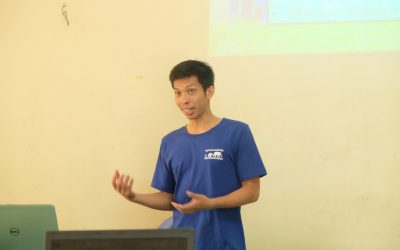We sat down with our Program Manager, Konthea and Executive Director, Kneath, to talk about some of JWOC’s strategic developments. As our new strategy progresses, we will become an entirely youth-focused organization, supporting young people aged 15-30. Our Scholarship program will continue to be the focus, and we will be increasing our efforts to improve the skills and capacities of High School students in Siem Reap. To find out more, read the interview below:
Why does JWOC have a new strategy?
Konthea: JWOC has been with the community for over 10 years, and as Cambodia has changed a lot we need to ensure that we are adapting to those changes. We see that there are new needs, especially the capacity of the youth because they make up 30% of the population. Now is a good time for them to be more involved in community development, so JWOC wants to contribute into that to build their capacities.
Kneath: As Konthea said, the needs of the community are changing, so this is also an opportunity for a celebration because what we’re seeing is an improvement of basic primary education and a greater choice of low-cost learning opportunities. Thanks to this success we can now start to look beyond basic access and start preparing Cambodia’s youth for life after school and the evolving job market.
What is the story behind the new mission statement?
Konthea: Our new mission statement is that we’re partnering with youth to fulfill their potential in education, employment and the development of their communities. We have seen that our youth need a lot of support; financial so that they can receive further education, but also 21st century skills development. We have seen that many Cambodian youth migrate because they don’t have skills, and inside and outside of the country they don’t receive decent employment. The purpose of JWOC has always been to create leaders so that they can develop the community, so we think that this is the right time to move forward to focus more on youth development.
Kneath: The decision to shift our mission and our new focus really came from about a year ago when we spent time working with and listening to our scholarship students and other key stakeholders, The areas they identified for supporting youth development were education, employment and community participation. We also have a fourth driver, which is the health and wellbeing of students.
Why is the Scholarship Program so important?
Konthea: We still see that even though the economy has developed a little bit in Cambodia, there are many youth from school who are struggling to go to further education, and mostly the Universities are in the big cities, so the students from rural areas need help in order to go to further education. We want to ensure that youth from all over the country have the same, equal chance, to get an education so that all of them can help their own community.
Kneath: As Konthea mentioned, the need and demand is still there. Last year, for example, the number of applicants for our Scholarship program increased by 90% from the previous year. A University education is needed so that students can develop their analytical skills and professional skills so that they can contribute to driving the local economy, supporting society, and effective governance, especially as Cambodia starts to move away from low-skilled labor.
What is happening to the Free Classes Program?
Konthea: There are many organizations, private schools and the government schools themselves are starting to add more subjects to support students who are in the primary level. In the Free Classes we have a big percentage of students from this level. The Free Classes program can still adapt to a different way, for example, the Scholarship students who used to volunteer in the Free Classes Program as teachers can go out to teach English at public schools in Siem Reap.
Kneath: It’s worth noting that in the last two years, parents of our students have been contributing towards those classes in terms of their textbooks, so the word “free” is outdated. The schedule of our Scholarship students volunteering on this program has changed as well; they’re under different pressures in terms of work and studying, so we’re finding new ways for students to give back to their community. We’ve learned so much from the Free Classes Program, and we’re going to take all that learning and use it in English and ICT classes for High School and University students.
What other exciting developments are happening across JWOC’s programs?
Kneath: The scholarship program continues, but we’re focused on increasing learning opportunities outside of volunteering the end goal is to ensure that students gain quality jobs upon graduation. That’s why we help students access University. For high school students, the aim is to ensure that the students are ready, so that when they graduate they know what they’re doing next, whether that be an internship, vocational training, University or work; we want to make sure that students know what options are available to them.
Konthea: Right now we are finalizing the new strategy, which means all our staff are really excited with their inputs and it’s also a process of learning as we build the plan together. We are also preparing to pilot our Youth Participation and Leadership Program, while the Free Classes Program is preparing itself for completion.We will also take more care of the Scholarship students’ health and wellbeing so that the students progress alongside their degree and prepare themselves for good employment with the capacity to give back to their community. To me, that is really exciting.




0 Comments